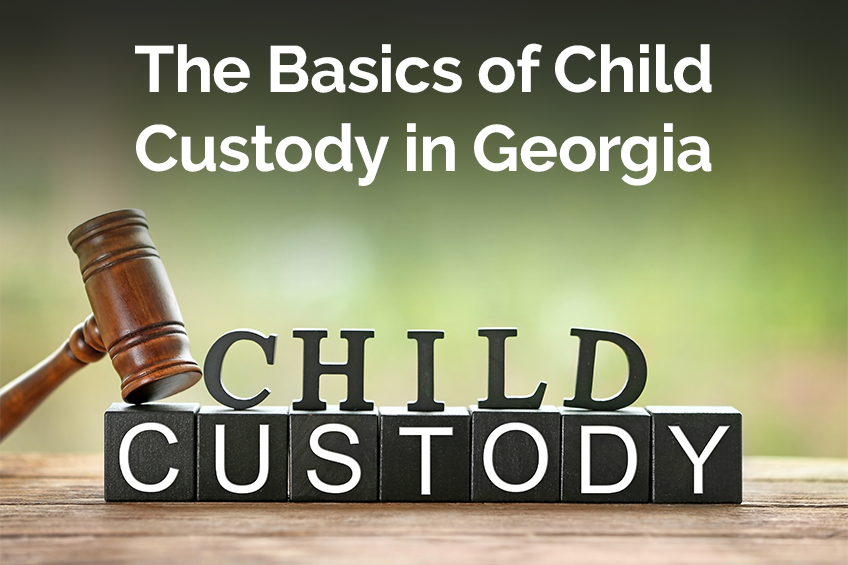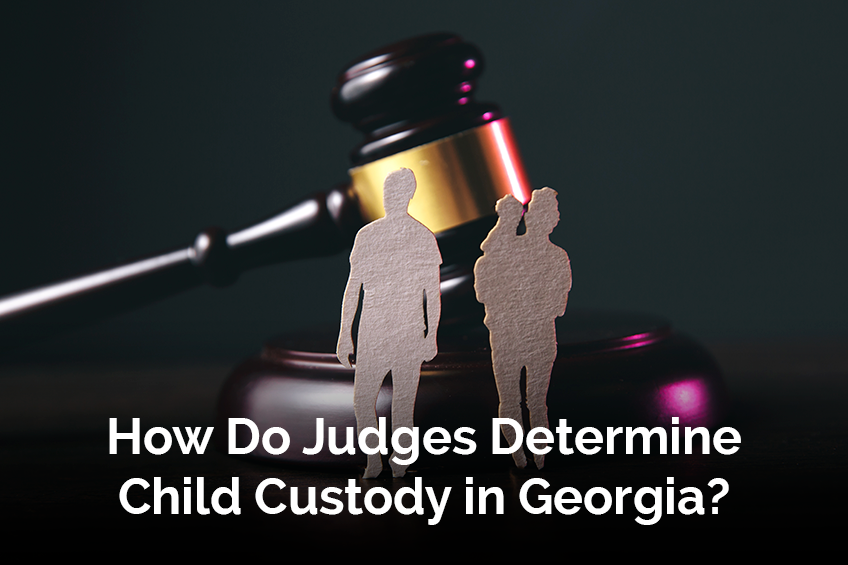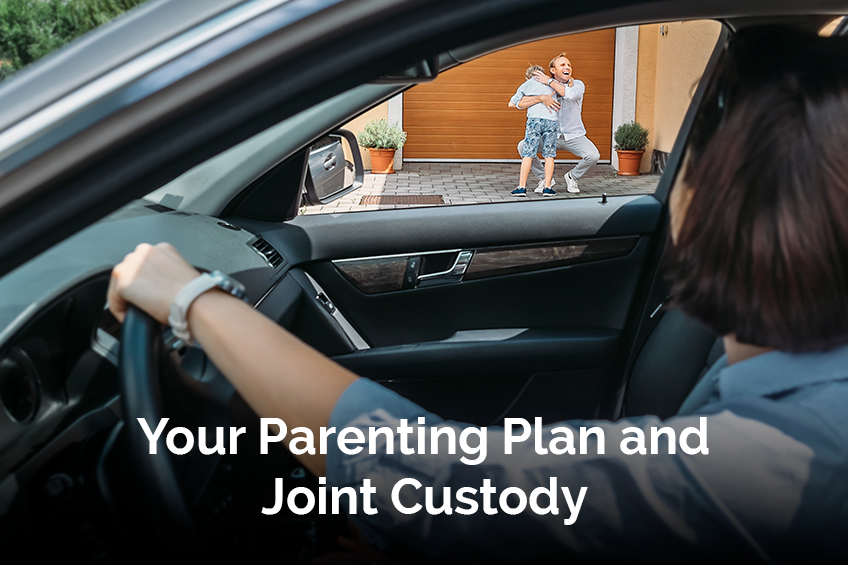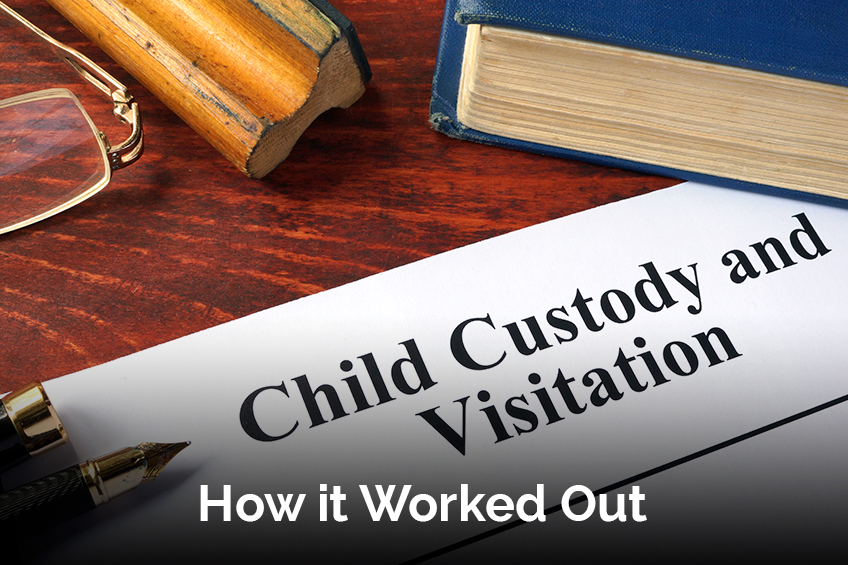
Can I Receive Joint 50/50 Custody of my Child in Georgia?
One question we’re frequently asked by our divorce clients is what their chances for getting joint custody are.
They usually want to know whether they can expect to have the child live with them some of the time – this is known as joint physical custody of the child – and what that part-time arrangement might look like.
And increasingly, divorcing parents are looking for joint physical custody with an exact or near 50/50 split.
The good news is that Georgia courts are awarding these joint custody arrangements more frequently than ever before.
The bad news is that while shared custody is granted to many divorcing couples who seek it, it is not always possible, and your success will depend on your ability to make a good case.
Your likelihood of being awarded joint child custody will depend largely on your circumstances, too.
Things like your ability to get along with your spouse and cooperate effectively for the benefit of the child, your ability to create a safe and stable home life for your child, your proximity to the child’s school and other family, and more can all factor into the decision to award joint custody.
Of course, knowing the intricacies of the law and having an experienced family law attorney on your side can make it easier to successfully win joint custody of your child.
With these things in mind, let’s take a look at what joint custody involves, how child custody is decided in Georgia, factors that can influence the judge’s decision, and the circumstances under which a 50/50 joint custody arrangement is most likely.

What Is Joint Custody in Georgia?
Legal vs. Physical Custody
Legal custody refers to parental authority in making major decisions for a child.
Physical custody specifically concerns where child will reside – whether with one parent or equally with both.
Joint legal custody in Georgia means that both parents take equal roles in making parental decisions for a minor child.
This type of custody arrangement allows both parents to have decision-making authority about things like the child’s education, healthcare, extracurricular activities, religious instruction, and more.
Joint legal custody is quite common in Georgia, but it is important to note that it is not the same thing as joint physical custody.
Joint physical custody is a custody arrangement where the child is expected to reside with each parent at different times.
Joint physical custody is what most people mean when they say they want shared custody of their child.
There are many types of joint physical custody arrangements, and it is important to note that not all involve an even 50/50 joint custody split.
Joint custody may involve more time at one home than another if that arrangement is deemed best for the child.
However, many joint custody arrangements can include equal or near-equal parenting time for each parent if the judge decides it is in the child’s best interests.
One of the most important things you and your divorcing spouse can do if you want to share custody equally is to come up with a well thought out parenting plan.
A divorce attorney experienced in joint custody arrangements can help you devise a parenting plan and help you demonstrate to the judge that it will be beneficial for your child.
Joint vs. Sole Custody
A judge in Georgia can grant either joint or sole legal custody and either joint or sole physical custody, as well.
Joint legal custody means both parents have the right to make important decisions, while sole legal custody means only one parent has that right.
Similarly, joint physical custody means both parents get to participate in parenting the child and that the child will spend time living with each.
A 50/50 joint physical custody arrangement is one where the child’s time (and residence) is split pretty much evenly between the parents.
In contrast, sole physical custody or primary physical custody means that the child lives with one parent most or all of the time.
When one parent gets sole or primary custody, the noncustodial parent will often be given visitation rights.
However, sole or primary custody with visiting rights is not the same thing as joint custody in Georgia.
While joint shared custody is somewhat less common than primary custody with visitation in Georgia, it is becoming more common as more people seek it – and as court attitudes toward shared parenting change.
Now that we’ve outlined the different types of custody under Georgia’s child custody laws – legal vs. physical, sole vs. joint – you may be wondering:

How Do Judges Determine Child Custody in Georgia?
A judge hearing a custody case in Georgia must decide on a custody arrangement that benefits the child above all else.
In order to determine the best custody arrangement for the child, the judge must consider a variety of factors, as stipulated by Georgia Code O.C.G.A. § 19-9-3.
Here are the 17 main factors for a Georgia judge to consider when deciding child custody:
- Parental Bond The love, affection, bonding, and emotional ties existing between each parent and the child.
- Bonds with Siblings in the Home The love, affection, bonding, and emotional ties existing between the child and his or her siblings, half siblings, and stepsiblings and the residence of such other children.
- Parenting Ability The capacity and disposition of each parent to give the child love, affection, and guidance and to continue the education and rearing of the child.
- Parental Familiarity Each parent’s knowledge and familiarity of the child and the child’s needs.
- Ability to Provide The capacity and disposition of each parent to provide the child with food, clothing, medical care, day-to-day needs, and other necessary basic care, with consideration made for the potential payment of child support by the other parent.
- Home Environment The home environment of each parent considering the promotion of nurturance and safety of the child rather than superficial or material factors.
- Continuity The importance of continuity in the child’s life and the length of time the child has lived in a stable, satisfactory environment and the desirability of maintaining continuity.
- Stability and Support The stability of the family unit of each of the parents and the presence or absence of each parent’s support systems within the community to benefit the child.
- Mental and Physical Health The mental and physical health of each parent, to the extent that it affects the parent’s ability to care for the child.
- Involvement with the Child Each parent’s involvement, or lack thereof, in the child’s educational, social, and extracurricular activities.
- Scheduling Limitations Each parent’s employment schedule and the related flexibility or limitations, if any, of a parent to care for the child.
- Individual Needs of the Child The home, school, and community record and history of the child, as well as any health or educational special needs of the child.
- Parental Performance and Ability Each parent’s past performance and relative abilities for future performance of parenting responsibilities.
- Willingness to Cooperate The willingness and ability of each of the parents to facilitate and encourage a close and continuing parent-child relationship between the child and the other parent, consistent with the best interest of the child.
- Expert or Outside Recommendations Any recommendation by a court appointed custody evaluator or guardian ad litem.
- Criminal Behavior Any evidence of family violence or sexual, mental, or physical child abuse or criminal history of either parent.
- Abuse of Drugs or Alcohol Any evidence of substance abuse by either parent.
The judge may also consider other factors beyond those stipulated above to determine what will best promote the child’s welfare and happiness.
The listed factors are very important, however, and demonstrating your ability to care for your child and showing what will be in the child’s best interest can heavily influence a judge’s decision.
That is why, if you are involved in a child custody case or seeking a child custody modification, having an experienced family law attorney to help you make your case is a must.
Does Georgia Law Favor Mothers in Custody Cases?
When deciding child custody cases, judges in Georgia are simply required to put the best interests of the child first.
For a very long time, that was interpreted, at least in part, to mean that children should spend more time with their mothers.
However, current Georgia law stipulates that custody decisions should be gender-neutral, meaning that mothers do not get preferential treatment.
This is great news for Georgia fathers seeking shared custody, since it means that Georgia dads have an equally good chance of being awarded custody.
If My Spouse and I Are Equally Fit to Parent, Does That Mean I Can Get Joint Custody?
Possibly, but there are some caveats.
First, a big one:
Judges tend to favor primary physical custody arrangements with visitation rights for the noncustodial parent over joint custody.
The preference of the courts in Georgia is often to grant equal legal custody (the ability to make decisions for the child) to both parents, while granting primary physical custody to just one.
The thinking behind this is that the child can benefit from the stability of residing in a single home while enjoying the involvement of the non-custodial parent through visitation.
Secondly, joint custody doesn’t always mean 50/50:
In cases where joint custody is awarded, the division of time is not always a clean 50/50 split.
That’s because stability and educational interests are sometimes better served by having the child spend more time in one place, or by staggered schedules built around school, extracurricular and work considerations.
If you want a 50/50 joint custody split, you will need to show the judge how it will benefit the child and not just how it will suit your own personal preference.
The need to make a good case to the court is another reason why having an attorney experienced in child custody cases can help your chances in court.
Now that you have an overview of child custody and what goes into deciding who gets it, you’re probably wondering:
How can you increase your chances of getting 50/50 joint custody of your child?

When Can Parents Get 50/50 Joint Custody in Georgia?
Increasingly, divorcing parents want equal time with their kids, despite a judicial predisposition toward primary custody arrangements.
Although in the past we have seen strong court preferences for single-parent custody, that doesn’t have to be how your child custody case is decided.
Judges in Georgia have a great deal of discretion when it comes to awarding custody, and a lot of weight is placed on the relationship between the divorcing parents and the practicality of a joint custody arrangement.
Knowing the things that can make a 50/50 custody agreement more likely can help you manage your expectations and take steps to work toward a favorable decision.
Six Factors That Can Affect Your Chances of Getting a 50/50 Joint Physical Custody Arrangement:
1. How well you and your ex cooperate and get along.
In our experience, judges in Cherokee County are less willing to order 50/50 joint custody if the divorce was contentious.
That’s because people who co-parent closely must get along well most of the time, agree on the child’s daily routine and make major life and legal decisions together. They should also be able to resolve any disagreements with minimal upheaval to the child.
2. Proximity of each of the homes.
Custody-sharing parents need to live in somewhat close proximity, to keep the child’s school routine running smoothly and eliminate the stress of long travel times.
3. Time and ability to meet parental obligations.
You must be able to get your child to appointments and extracurricular activities regularly, too, so having a consistent or flexible work schedule may figure into the decision. You will also want to demonstrate that you have the time and commitment to be actively involved in parenting your child.
4. The age and unique needs of the child.
Older children may adapt more easily to moving from one parental home to another, while young children and those with special emotional needs or physical disabilities may be better served by a primary custody arrangement. The judge deciding your case will look closely at factors like these when deciding custodial arrangements.
5. The child’s wishes.
In Georgia, a child can choose which parent to live with when they turn 14, and judges will generally abide by this choice as long as the choice is in the child’s best interests.
Judges also have the discretion to take the preferences of a child aged 11-13 under consideration, but other factors, such as the child’s educational needs, will come first.
6. Whether both parents are in favor of a 50/50 agreement.
It’s not necessarily a deal-breaker if one parent objects to a 50/50 joint custody arrangement, but it definitely helps if you and your spouse are on the same page. Try to talk things out and come up with a parenting plan that both of you can live with before heading into court.

Your Parenting Plan and Joint Custody
As part of the process, divorcing couples must draw up a parenting plan that outlines how they prefer to split legal decision-making and time-sharing for their children.
The plan outlines how you intend to keep the parent-child relationship intact while putting the child’s best interests first.
Parenting plans must have very specific requirements to be considered valid by the courts, and having an attorney’s help in drawing one up can be invaluable.
Specific points that should be addressed in the parenting plan include:
- Where the child will live – and when, if physical custody will be shared.
- How and where the child will spend special occasions such as holidays, birthdays, and school breaks.
- Your plan to transport the child to and from each parent’s house, how you plan to exchange the child, and who pays for transportation costs.
- Whether visitation will be supervised, and who will supervise.
- How you plan to divide decision-making and resolve disagreements regarding the child’s education, healthcare, religious involvement, and other upbringing issues.
- Specifics regarding the non-custodial parent’s right to contact the child and have access to their records and information.
Having a well outlined plan for how your child will split time between homes, with clear scheduling objectives and logistical considerations, can strengthen your case for a 50/50 physical custody agreement.
You will also need to show that your plan will serve the best interests of the child and that you’re capable of upholding the obligations of your plan.
What You Can Do to Help Your Chances for Joint Custody
While you can’t control every variable, there are some things you can do to make a joint custody agreement more likely:
- If you or your spouse are considering residences far apart, consider living closer so a joint custody arrangement will make more sense for your child.
- Wherever possible, adjust your work schedule to make it better accommodate your child’s schedule and the demands of parenting.
- If you and your ex are having trouble getting along, consider mediation and try to agree to a custody arrangement that works for both of you ahead of time.
- Another major factor in how the judge decides custody is a strong and workable parenting plan.
Factors That May Hurt Your Chances for a 50/50 Joint Custody Arrangement
When You And Your Spouse Disagree
In an ideal divorce, both parents would agree on all the specifics of child custody.
But the ideal divorce is exceedingly rare.
Judges are often reluctant to award equal custody to parents who are sharply in disagreement or who exhibit obvious animosity.
If you and your spouse can’t agree on a child custody arrangement or if your relationship is too volatile to make agreement possible, the court may take steps like ordering a custody evaluation or appointing a guardian ad litem.
Try to resolve differences through mediation or counseling before you see a judge, if possible.
Bad Behavior
The court will consider both parents’ behavior during the marriage when deciding what is in the best interests of the child.
Specifically, factors that affect how well each parent will be able to care for the child and create a healthy environment will weigh heavily.
There may be circumstances where one spouse is found to be unfit to parent, usually because of abuse, neglect, or a history of substance abuse.
In instances where both parents are found to be unfit, a third party, such as a grandparent or close relative, may be assigned custody.
A Case in Point: How Speights Law Helped Our Client Win a Favorable Joint Child Custody Agreement
We see a lot of divorce clients in our practice, including many loving parents who are seriously worried about child custody post-divorce.
Although every case is unique, our experience has taught us that most parents will go to great lengths to ensure they get to be a meaningful part of their kids’ lives.
That was the case with our client, Joshua: a father of two kids, aged 8 and 12, whose marriage was ending.
He and his wife initially separated on what seemed to be good terms, but things steadily deteriorated to the point where they were barely speaking.
By the time he called us, they couldn’t agree on much. They would argue about little things, as well as about larger decisions like who should get to stay in the family home.
He told us he was afraid to even talk about child custody with his soon-to-be ex, since he’d heard so many times that custody agreements almost always favored the mother.
Joshua was a very involved father who took his daughter to soccer practice and went out of his way to make sure his son always had help when he needed it with homework.
He simply couldn’t imagine a life without lots of time with his kids. It was a large part of why he waited so long to accept that his marriage wasn’t going to work.
As a stable, responsible and committed father, he wanted joint custody and was willing to do whatever it would take to win it.
Our legal team set to work to help him.
What We Did For Joshua
The first thing we did was explain that under Georgia law, the court is not allowed to favor the mother over the father in child custody cases just because she is the mother.
Fathers have equal custody rights in Georgia, provided they are fit to parent and the custody arrangement is in the best interests of the child.
Next, we laid out all the factors judges consider when deciding custody in a divorce case.
Joshua didn’t have a history of substance abuse or a criminal record, and he had a good job that paid well enough for him and his family to live a comfortable middle-class lifestyle.
He’d also been very involved in his children’s daily lives and care, and the kids loved their dad just as much as they loved their mom.
So far, so good.
However, there were other things that could harm his cause in the eyes of a judge, and we wanted to get ahead of them.
We identified some potential issues:
- Joshua had a job that required frequent travel, sometimes keeping him away for long periods.
- Joshua’s absences meant that his wife had assumed many of the regular child care duties, like taking the kids to school and handling doctor’s appointments, dentist trips and shopping.
- Both of his parents had passed and the rest of his family lived far away, limiting Joshua’s ability to rely on family for child care and enrichment.
- His frequent work travel had been an issue for his wife, who accused him of infidelity and let this dissatisfaction fuel her animosity.
Armed with knowledge of the situation, we got to work figuring out what we could change and how to deal with the things we couldn’t.
Upon learning that his work schedule might become an issue, Joshua told us he was prepared and able to take on a different role with his company—one that limited his travel to just a few times a year.
We talked to him about the role he’d played in his children’s lives and whether his kids’ teachers, coaches and other parents could vouch for his involvement.
We also discussed his involvement and ties to the community, including his volunteer work and his role within his church—where his kids also took an active role.
All of these things could make his case for joint custody stronger, either in a courtroom or—even better—at the negotiating table beforehand.
Finally, we made a list of concessions he could live with, including letting his wife stay in the house while he rented a suitable residence nearby.
Our plan also included getting a mediator involved, so that he and his wife could work out their differences in a neutral arena before ever heading to court.

How it Worked Out
Knowing that his case for joint custody was stronger than he’d suspected helped lower Joshua’s anxiety level and gave him a clearer head when talking to his wife.
She was still very angry herself and pushed for sole custody with visitation, at first.
However, Joshua’s strong legal case and our collaborative engagement helped his wife’s lawyer persuade her not to pursue a long custody battle in court.
That was a big relief for Joshua, especially knowing that the stress, difficulty and expense could seriously affect the kids now and in the future.
The presence of a mediator helped immensely with communication, and with her help, they were able to figure out a living situation and division of property that was best for all concerned.
More importantly for Joshua, the mediator also helped them figure out a parenting plan they both could live with—one that included an equal physical custody split between him and the children’s mother and an equal say in legal custody matters.
Of course, there were concessions that had to be made, as with so many negotiated agreements.
Joshua did need to change his role within his company, but the change wasn’t as drastic as he’d expected.
He and his wife were able to work out a custody-sharing plan that accounted for a set number of work trips, allowing him to avoid a salary cut that would harm his ability to pay for the kids’ school tuition .
His wife wouldn’t budge on staying in the house, but Joshua was able to find a great place less than a mile away so he could always be nearby.
All in all, Joshua got the things that were most important to him—more time with his kids, no difficult fight in court, and the knowledge that his kids could continue their education at a school they were used to.
Cherokee County Divorce Attorneys
You hear a lot about the hard-fought divorce battles—and we are experts at winning those, too—but the best divorces are those that are won before you ever set foot in a courtroom.
With diligence, preparation and years of experience, our family law team works harder—and smarter—to get you the outcome you deserve.
FAQS About Joint 50/50 Custody in Georgia
1. Is it hard for a father to win joint custody?
The Georgia courts do not give preference to mothers when deciding custody issues, so fathers should not be at any disadvantage when seeking 50/50 custody. The main factors influencing the decision will be the best interest of the child and the ability of the parents to work together and carry out any joint custody agreement.
2. Does joint custody affect child support? Will I pay less than a non-custodial parent?
Child support in Georgia is calculated based on a formula that takes into account the income of both parents and necessary expenses for the child. There are several adjustments the court can choose to apply to these, and one of these is known as the parenting time deviation.
If you are caring for the child for more time than average, either because of joint custody or increased visitation, your child support responsibility may be reconfigured at the discretion of the courts. Each situation will be evaluated based on the best interests of the child, however, and joint custody does not always equal lower child support payments.
3. How does joint custody scheduling work?
Most people have heard of joint custody situations where the child spends one week with one parent and the next with the other, but there are many other arrangements that work well for both children and parents.
A 2-2-3 schedule gives the child two nights with each parent and then three nights with one, with parents taking turns each week on the three-night weekend. There are also 2-2-5-5 schedules, 3-4-4-3 schedules, 4-3 schedules and weekend schedules where the child lives with one parent for most of the week and the other during a long weekend.
Consider your child’s needs and temperament as well as your own obligations when figuring out the right custody schedule for everyone.
4. I didn’t get joint custody after our divorce. Can I get it now?
Relationships change, circumstances change and custody arrangements can change with them. If you weren’t initially granted a joint custody arrangement, it’s possible that you and your spouse can renegotiate custody after some time has passed and strong feelings have died down.
Situations like an improved work schedule, closer proximity and an ability to work with your ex may make a court look favorably on a joint custody arrangement. Also, as young children get older, a judge may find that joint custody is desirable where previously it was not. A legal professional can advise you on your options and chances for a joint child custody modification.
5. How likely am I to get joint custody?
Many factors can influence the likelihood of a joint custody agreement. Judges consider things like the fitness of both parents, the practicality of a joint custody arrangement, and the overall needs of the child.
Although joint custody is not the default in Georgia child custody and divorce cases, building a strong case with the help of an experienced child custody lawyer can help you achieve the results you seek.

Trying to Get Joint Custody of Your Kids? Talk to An Experienced Family Lawyer in Cherokee County
If you’re currently navigating divorce, don’t wait to talk to a lawyer. The terms you set for your divorce could shape your life – and your children’s – for many years to come.
At Speights Law, we have an outstanding record of success helping our clients achieve what’s best for their family.
We Work Hard for You
You hear a lot about hard-fought divorce courtroom battles – and we are experts at winning those, too – but the best divorces are those that are won before you ever set foot in court.
With diligence, preparation and years of experience, our family law team works harder – and smarter – to get you the outcome you deserve.








